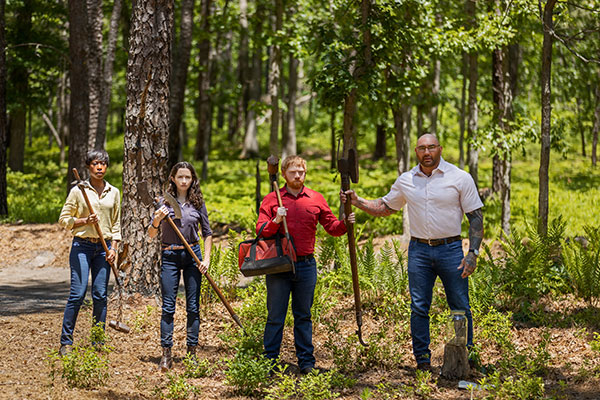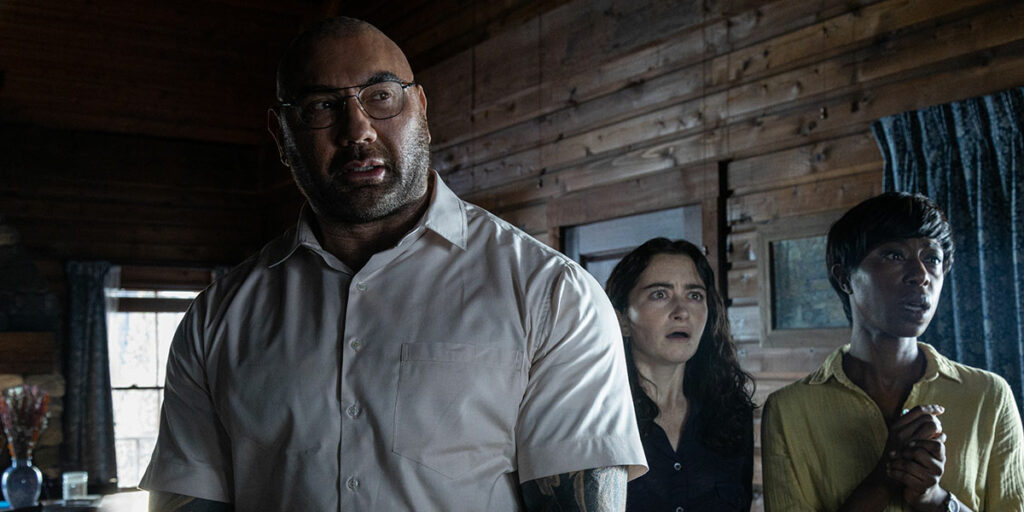Knock at the Cabin shows you cannot knock Shyamalan’s talent at crafting tension, even if everything else ends up strange as a result.
Knock at the Cabin starts off with a close up shot of a grasshopper. If you thought that was bizarre and out of nowhere, then congratulations! You now have an idea for the entire movie’s tone.
Directed by M. Night Shyamalan, Knock at the Cabin follows a gay couple, Eric (Jonathan Groff) and Andrew (Ben Aldridge), and their adopted daughter Wen (Kristen Cui) walking right into a horror movie trope by vacationing at a lone cabin in the woods. And sure enough, their vacation quickly turns sour when four armed strangers led by Leonard (Dave Bautista) break into their cabin and demand the family to sacrifice one of them, or else the world will end.
Like him or not, you have to admit Shyamalan is an interesting director. He has a very distinct style that you can immediately recognize from just a few scenes of his movies. Not only are his lines written like he’s put them through Google translate twice, but he often employs strange camera angles as well as a gratuitous amount of into-the camera shots. It’s gotten to the point where even if his movie is bad, it is so bizarrely bad that you can’t help but be entertained.
Knock at the Cabin continues to marinate in that style. I mean, the opening scene with two characters talking is shot like both of them are centimeters away from deep kissing the cameraman. However, Shyamalan has also found a method to try and “fix” those flaws: he comes up with situations where such elements work in favor of the overall atmosphere. For instance, Split had a guy with a scrambled personality. Old starred kids who were hitting puberty far too fast, naturally inviting some very confused discussions about sex.

In Knock at the Cabin, the awkward elements work because that is the point: you are supposed to be put off by the fact that Leonard and the intruders sound like they inhaled an entire cargo of drugs. Their talks about how the world will end are ludicrous, and yet they are committed enough to take action based on that story. You can never be sure of how far they will go, and this makes them truly unsettling antagonists.
What makes the intruders even more impactful is that they show touches of humanity. Not only do they have normal lives and jobs, but they feel genuinely sorry for pushing the sacrificial choice onto the family. And those human moments alienate us more because, despite that, they still won’t back down from their mission. Dave Bautista sells this especially well. His expression throughout the film is like cracked steel; it is taking him all he has to keep his resolve unbreakable, which makes him feel even more unpredictable.
Thanks to this, Knock at the Cabin builds incredibly solid tension around its central premise: whether this family chooses to believe in Leonard’s ludicrous story or not. It keeps both the family and the audience guessing on whether the apocalypse thing is real or some sick suicide group hoax. And even if the family buys into Leonard’s story, there’s still the question of whether they will actually sacrifice one of their own or not. The movie keeps the stakes clear but the actual outcome unpredictable, which allows for a constant suspense throughout the film.
Yet, despite that rock solid tension being more than enough the price of admission, it cannot make up for the fact that many other elements of the film end up undercooked. For instance, Shyamalan tries to give the family more characterization than just being unfortunate victims. That itself is fine, it is even desirable. But it is implemented through flashback scenes put in throughout the movie that feels intrusive to the overall pacing, like if you kept slipping me a packet of vitamins while eating a happy meal. I can see why I need them, but they don’t mesh properly.
Another issue is Wen, who seems to constantly shift between important and pointless. She serves as a good motivation for Eric and Andrew’s conflict, but that also means most of the emotional heavy lifting is left to those two, leaving Wen rather lost on what to do herself. It doesn’t help that Kristen Cui is the only actor who seems to be rather lost in Shyamalan’s style; her delivery feels especially awkward, although perhaps it’s less due to the actress and more that her dialogue feels far too sophisticated for her character’s age.
And while Shyamalan manages to turn most of his awkward style in his favor, there are some parts where conversations sound far too wooden. For instance, the four intruders decide to suddenly list off their backgrounds to the family like they’re in an icebreaker. They claim they’re doing that to emphasize they are normal people, but it just makes the flow of events more abnormal.
Then there is the ending, which is the main source of my very conflicting thoughts on the film. As mentioned, the driving question throughout the story is whether Leonard’s story is real or whether he’s read too many doomsday theory threads on Reddit. The movie chooses to be pretty clear cut with its answer. That doesn’t necessarily break the movie. It still stays consistent with its themes and gives us some questions to reflect on.
However, I can’t help but feel this is a story that would have benefitted from a more ambiguous approach. I can’t spoil much, but if Shyamalan had decided to focus solely on the family’s love being the most important instead of trying to provide us with an answer, I think that could have sparked even more discussion. Again, the movie didn’t need to be that way, but it’s like it chose a PS4 over a PS5 as a birthday present. The difference is miniscule enough to still appease, but prominent enough to nag.
Despite that, I was largely satisfied with Knock at the Cabin. It’s not one of Shyamalan’s best works, but it’s where his style found a script that could properly present its positives, while keeping the negatives to a minimum. In fact, I see this as a good entry-level Shyamalan movie. One where you can test your tolerance for the director’s style and see if you want more. At the very least, it’s well made enough to convince you to cancel any vacation plans in the woods.
Knock at the Cabin is now available to watch on digital and on demand. Read our reviews of M.Night Shyamalan’s Trap, Old, The Sixth Sense, Split, Glass, The Visit, and The Last Airbender.

